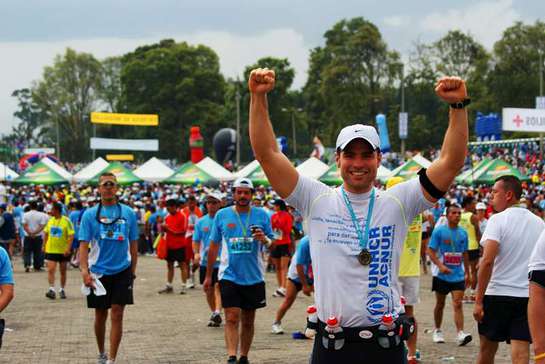Ecuadorean actor Roberto Manrique has gathered a loyal following in the region for his roles in Latin American telenovelas, or soap operas. The 31-year-old soared to stardom after appearing in soaps such as “Los Victorinos” and “El Clon.” But away from the small screen and the stage, he has recently developed a keen interest in the welfare of refugees in a country that hosts some 135,000 people of concern to UNHCR.
Most of them are from neighbouring Colombia, where Manrique works for the Telemundo network. His interest in refugee issues stemmed from a chance meeting in Bogotá with Xavier Creach, head of UNHCR’s office in the northern Ecuadorean town of Lago Agrio. Creach invited the actor to visit the area and meet refugees in the rainforest. Manrique talked recently to UNHCR Public Information Officer Sonia Aguilar about his humanitarian work and his association with UNHCR.

Credit/Copyright: UNHCR
Excerpts from the interview:
When did you first start helping refugees?
In January, I had the opportunity [following his meeting with Creach] to travel to the town of Lago Agrio in the northern province of Sucumbios. I visited three isolated communities in the jungle close to the border with Colombia. I gave a concert and juggling show for the children and their parents. It was a moving experience that taught me a lot about refugees and made me more aware of the challenges and hardship they face. It also made me want to do something to help.
What struck you most about these refugees?
Their strength. I was impressed by their fighting spirit and by how they kept laughing and retained their hope despite such a hard life. I was filled with admiration by their smiles amid such pain. For me, they became models of tenacity, strength and spirit in the face of many hurdles.
What do the refugees and host communities need most?
What I found was that they needed things like shelter, employment, education and clean water. Many things in their lives have improved thanks to help from UNHCR and the Lago Agrio municipality, but there is still a lot to do. I think that things could get even better with the support and solidarity of governments. I think donors should focus on integration and education programmes. I also think it will be very important to work with the host communities to ease the process of acceptance.
You have supported UNHCR on other occasions since, including World Refugee Day on June 20. Do you want to continue working with us?
Absolutely. I am determined to carry on cooperating with UNHCR to raise awareness about refugees. I’d also like to get support from others, including businesses willing to help refugees by broadening their corporate social responsibility programmes. I’d also like to work in the field with refugees. I never imagined my trip to Lago Agrio would be so rewarding on a personal level. It is essential to meet people, because that gives my work meaning.
Has living in Colombia made you more sensitive to refugee issues?
My love for Colombians is special. I owe their country the best years of my life. I appreciate their charisma, sympathy, humour and their positive attitude towards life as well as their work ethic. All this makes me empathize when I realize that Ecuador has the greatest number of Colombian refugees [in Latin America]. But, for me, borders are artificial creations of man. Brotherhood keeps mankind as one.
What can celebrities do to spread awareness about refugees?
People working in the public eye, movers and shakers, can do something valuable and meaningful. I am convinced that this is a role at the service of society. There is much to do, much to change and improve.
Audiences in Latin America seem to be unaware of the scale of the problem.
Due to extreme social inequalities in our countries, we tend to cocoon ourselves and turn a blind eye to social gaps. And because many refugees live in remote rural areas, they become even more invisible. Ecuador hosts more refugees than any other country in Latin America, but few people in the region are aware of this.
It is high time we opened our eyes and hearts and started showing solidarity and facing this reality proactively. We must demand action in this neglected area.
I think people need to be socially aware, whatever their position or profession. My father was a doctor and he devoted his last working years to social service, even though his financial situation was not so good. He was a role model to me.
Source: UNHCR





